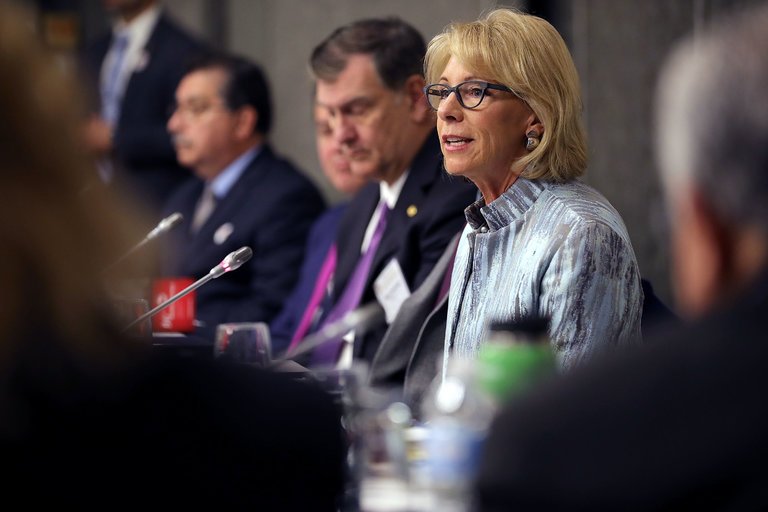Three Civil Rights Groups Sue Betsy DeVos, Education Dept. Over Sexual Assault Policies
The groups cite a negative effect on sexual assault survivors since DeVos rescinded the Obama-era Title IX guidance. Secretary of Education Betsy DeVos. In September, DeVos rescinded Obama-era guidance on how colleges should manage sexual assault investigations. (Chip Somodevilla / Getty Images)
Secretary of Education Betsy DeVos. In September, DeVos rescinded Obama-era guidance on how colleges should manage sexual assault investigations. (Chip Somodevilla / Getty Images)
Three civil rights organizations filed a lawsuit Thursday against the Department of Education and Secretary Betsy DeVos for rescinding Title IX guidance on campus sexual assault in September 2017. DeVos previously said the guidance was biased against the individuals accused of assault, adding that it was part of a “failed system.” She also called the proceedings that took place under Title IX “kangaroo courts.”
The groups suing DeVos and the Department of Education are SurvJustice, Victim Rights Law Center and Equal Rights Advocates. Several litigators will represent the groups, including the National Women’s Law Center, National Center for Youth Law, Equal Rights Advocates itself, and Democracy Forward Foundation.
CNN adds:
The lawsuit, which was filed in the US District Court for the Northern District of California, lists DeVos, the Department of Education and Candice Jackson, the top civil rights official at the department, as defendants. Jackson came under fire for saying in a New York Times interview that ’90 percent’ of sexual assault allegations come after drunken hookups. She later apologized.
In the lawsuit, the groups allege that the Education Department’s new rules surrounding sexual violence on campus were built on “unfounded generalizations about women and girls, particularly their credibility regarding reported experiences of sexual harassment, including sexual violence.” The groups are calling for the Trump administration’s Title IX policy to be vacated.
In a collective statement made by the three groups, SurvJustice, an organization that provides legal assistance and policy advocacy for sexual assault survivors, said that the DeVos Title IX rollback was detrimental to its work on college campuses, adding, “As an organization that provides direct assistance and referral services to survivors of sexual violence, SurvJustice’s core mission and daily operations have been and will continue to be impeded by the chilling effect that the 2017 Title IX policy has had and continues to have on the reporting of sexual violence.”
SurvJustice said that because of the rescinding of the Title IX assault guidance it has had to “devote significant staff time to reviewing and understanding the 2017 Title IX policy in order to advise clients in ongoing campus investigations and advocate on their behalf.” Furthermore, SurvJustice said that because of DeVos’ policy change, the group witnessed a “decrease in the number of sexual violence survivors [on college campuses] seeking its services.”
The Equal Rights Advocates group said it “had to divert staff time and resources away from core programmatic activities, such as litigating employment-related civil rights enforcement cases and cases involving Title IX enforcement that do not relate to sexual violence in schools” so that it could help students confused by DeVos’ Title IX policy change.
Stacy Malone, the executive director of the Victim Rights Law Center, told CNN that before 2011, sexual assault survivors “did not feel like they had a voice on their own campus.” Without the guidance, she said, “They fear they are no longer able to get a fair shake. Their reports will not be taken seriously because survivors will be dismissed as women who had drunk regret sex as opposed to who they really are, victims of sexual violence.”
The New York Times provides context for the policy rescinded by DeVos:
The Obama-era guidance, issued in 2011 and 2014, reinforced the obligation of colleges and universities to respond to sexual assault claims and was widely hailed as strengthening protections for accusers amid increasing evidence that those institutions were skirting their responsibilities to investigate sexual misconduct. But it was widely assailed by men’s rights and conservative civil liberties groups as heavily biased against the accused. …
Ms. DeVos issued interim guidance that raised the standard of proof for accusers to “clear and convincing evidence” from a “preponderance of evidence” and allowed cases to be settled in mediation sessions between the accuser and the accused. It also dropped time frames for completing investigations.
After rolling back the guidance, the Department of Education announced that it planned to enact new rules after a public comment period, but it has yet to provide a timeline for doing so.
Your support matters…Independent journalism is under threat and overshadowed by heavily funded mainstream media.
You can help level the playing field. Become a member.
Your tax-deductible contribution keeps us digging beneath the headlines to give you thought-provoking, investigative reporting and analysis that unearths what's really happening- without compromise.
Give today to support our courageous, independent journalists.








You need to be a supporter to comment.
There are currently no responses to this article.
Be the first to respond.